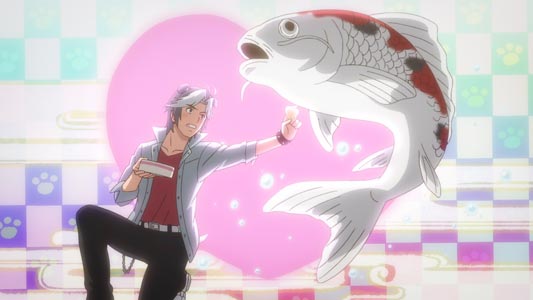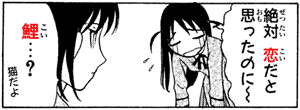来い
The word koi 来い is the meireikei 命令形, "imperative form," of the irregular verb kuru 来る, "to come," which is opposite to iku 行く, "to go."- kocchi ni koi
こっちに来い
Come here. - acchi ni ike
あっちに行け
Go over there.
Since kuru 来る can be used as an auxiliary verb, so can koi 来い.
- yakisoba-pan katte koi
焼きそばパン買ってこい
Go buy a yakisoba bread and then come back here. - benkyou shi-naoshite koi
勉強し直してこい
Go study [it] over again, then come back here.- Phrase probably used when someone hasn't studied something enough.
- hashitte koi
走ってこい
Go run, then come back here.
Come here running. - tonde koi
飛んでこい
Go jump, then come back here.
Come here jumping. - orite koi
降りてこい
Come here falling.
Come down here. - kakatte koi
かかってこい
Bring it on!- Phrase used when starting a fight with someone.
恋
The word koi 恋 means "love" in the romantic sense. It differs from ai 愛, for example, which means love in a more general sense, including familial sense, or divine sense.More practically, koi 恋 is the sort of love that gets your heart-shaped pupils in anime, while ai 愛 does not.
- hatsu-koi
初恋
One's first love. - {koi suru} otome
恋する乙女
A maiden [who] {loves [someone]}. - koi ni ochiru
恋に落ちる
To fall in love. - koibito
恋人
Lover. Partner.
The kanji is also read as ren 恋.
- ren'ai
恋愛
Romance. - ren'ai mono
恋愛もの
Romance works. Romance stories. Romance manga, anime, movies, books, etc. - shitsuren
失恋
Failed love. When the person you love doesn't love you back, and you have to give up on it.
鯉
The word koi 鯉 refers to the carp. The koi carp, Cyprinus carpio, which is a fish. In manga and anime, the carp is frequently used in visual puns when a character falls in love.
Anime: Uchi Tama?! Uchi no Tama Shirimasen ka? うちタマ?!~うちのタマ知りませんか?~ (Episode 2)
As well as in textual puns.
Manga: School Rumble, スクールランブル (Volume 1, Chapter ♭01 Wonder Woman)
- Context: Tsukamoto Tenma 塚本天満 sees her younger sister, Tsukamoto Yakumo 塚本八雲, packing a lunch box for someone. She guesses the food is for a boyfriend. It turns out she was just feeding a stray cat.
- zettai koi dato omotta noni
絶対恋だと思ったのに~
Even though [I] absolutely thought [it] was love...
But [I] was sure [it] was [it] was love... - koi...? neko dayo
鯉・・・?猫だよ
Carp...? [It] is a cat.
濃い
The word koi 濃い is an i-adjective which means a "strong" flavor or smell, or a "deep" color, or that something is "dense," or "thick" in consistency. It's antonym is usui 薄い, which means a "weak" flavor or smell, a "thin" consistency, and so on.- koi aji
濃い味
Strong taste. - koi nioi
濃い匂い
Strong smell. - koi iro
濃い色
Deep color. - koi ekitai
濃い液体
Thick liquid. - koi gasu
濃いガス
Dense gas.
Although they have multiple translations in English, the basic idea is usui 薄い is when something feels "watered down," be it flavor, smell, color, and so on, while koi 濃い is the opposite of watered down.
In other cases, you wouldn't use koi and usui. You would use:
- tsuyoi
強い
Strong. Powerful. - yowai
弱い
Weak. - fukai
深い
Deep. Profound. (can be used toward colors.) - asai
浅い
Shallow.
Pale. (color.) - atsui
厚い
Thick. (diameter.)- Not to be confused with:
- atsui
熱い
Hot.
- hosoi
細い
Thin. (diameter.).


No comments: